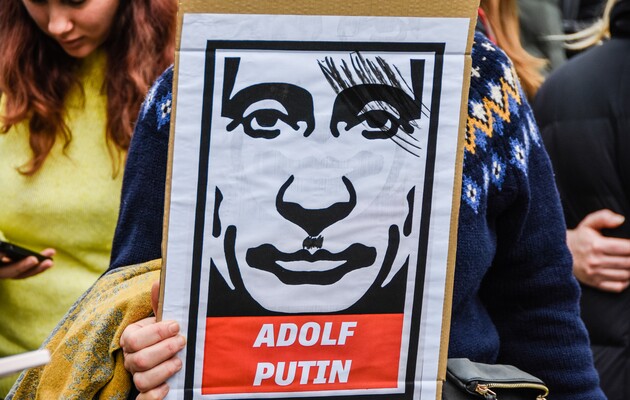The writer believes that Putin knows the value of stories, and they can help defeat him.

In 2015, Norwegian television broadcast the first season of the series, which became a film adaptation of my novel “Occupied” (a series in the genre of fantasy thriller about the near future – ed.). He spoke of Russia's fictitious occupation of Norway, with the tacit agreement of the EU and the United States, which saw it as a relaunch of Norwegian refineries that had been shut down by the green government.
My goal in creating this show was to focus on the moral dilemmas that ordinary people face in extreme situations – to draw an analogy with what our grandparents experienced during the German occupation of Norway in 1940-1945. Maneuvering between a small country, a powerful neighbor and other nations that rule the world, that balance political principles with economic considerations and security, and act as a backdrop, Norwegian writer, screenwriter and musician Yu Nesby writes in an article for The Guardian.
I thought it was obvious that the point of the fictional world of the Occupied was not to say a word about the Russians. Just like the meaning of Steven Spielberg's Jaws was to say nothing about great white sharks. But the Russian authorities did not take it very well. Ambassador to Norway Vyacheslav Pavlovsky told the Russian news agency TASS, “Of course it is unfortunate that this year, when the 70th anniversary of the Victory in World War II is celebrated, the authors seem to have forgotten about the heroic contribution of the Soviet army and decided in the worst traditions of the Cold War to frighten Norwegian viewers with a non-existent threat from the east. “
Read also: Russian culture: how the “little man” breeds great sorrow
It may be that the ambassador's resentment was dictated by the fact that Russia occupied Crimea a year earlier. But The Occupied was written and put into production long before that. It was a work of art in which, this time, the Russians were not portrayed as robotic “bad guys.” So why the rage?
Perhaps the answer is that in an era where truth is devalued by fake news, when leaders are elected on a wave of emotion rather than their political views and merits, facts no longer have the weight they once had. The description of the war that Russia started in Ukraine most often uses a quote from US Senator Hiram Johnson, who said in 1917: “when the war begins, the first victim is the truth.” It is used, among other things, to remind journalists how vulnerable the truth becomes when two sides fight to dominate their version of events.
In 1937, when Nazi General Franco bombed the town of Guernica, killing civilians, many could tell what had happened. As soon as images of destruction and casualties began to appear, Franco and his generals realized the emotions they would evoke in Spain and abroad, and said that Republicans had destroyed their own city. For a while, this version was believed – at least by those who wanted to believe it. But the best narrator was on the side of the Republicans. Pablo Picasso responded with one of his most famous paintings, Guernica, which depicted hell in a small Basque town. This work, written by a Parisian, the fruit of the artist's imagination and experience, opened the eyes of Europe.
If “Guernica” was both propaganda and a masterpiece, the same can be said about Sergei Eisenstein's film “Battleship Potemkin”, commissioned by the Soviet authorities to mark the 20th anniversary of the 1905 revolution. Although both works claim to depict real events, they also use considerable artistic freedom – for example, the famous scene of the massacre on the steps in Odessa has never taken place.
But the narrator of fiction does not need to worry about such details; the goal is to say something true, not necessarily factual. To touch hearts and minds, not to tell who, what, where and when. This freedom gives fiction power, especially when we, as viewers, do not realize that we are being promoted.
Tanner Mirrlis, author of Hearts and Mines: The Cultural Empire of the US Empire, describes how the US Military Information Administration set up a unit to work with Hollywood during World War II, the Bureau of Cinematography. Between 1942 and 1945, the Bureau reviewed 1,652 scenarios, correcting or removing anything that portrayed the United States in an unfavorable light, including material that forced Americans to “ignore war or antiwar views.”
According to Mirrlis, films have been and remain an ideal tool for shaping public opinion, because watching a film gives people a galvanizing, shared experience. Hollywood promoted American military ideals during the Cold War and continues to do so even now.
Today, the whole world, in fact, sits in one cinema and watches the events in Ukraine. But what we see, figuratively speaking, are duplicate versions with subtitles in our languages. There is a battle between different versions of history and the best will win.
So the question is, what steps are we willing to take to win minds and hearts, especially when Vladimir Putin uses censorship and propaganda that we think are a thing of the past. Is it desirable and even appropriate to play by his rules? It seems contradictory that a democracy can abandon principles such as freedom of speech and transparency, even in an attempt to defend them.
We can hope that the truth – the imperfect, subjective truth of a journalist, artist or other narrator trying to express something true – will win. After all, there are examples of this, such as the Soviet Union, which collapsed from within, or Donald Trump, who was thrown out of the White House. Faced with a tedious tangle of different versions of reality, we can not agree that each of them is true in its own way. Some are really more faithful than others.
Putin's stories about why he started the war in Ukraine are gaining popularity among Russians who do not have access to social networks or foreign reports. But the younger generation is using VPNs or other technology cells to access different perspectives. Their number is still small, but it is an ingenious group that will eventually become journalists, writers and artists who use history as a weapon.
We monitor military events, sanctions and diplomacy every day. But the war for narration is a long war. Which Putin will ultimately lose.
Franco ruled Spain for almost 40 years. But in the end he was defeated in history textbooks. Guernica was first shown in Spain in 1981, six years after Franco's death. In the first 12 months alone, it has been seen by more than a million people, and it still remains one of the most attractive in the Queen Sophia Gallery in Madrid. Because the truest – if not the most fact-based – stories are the best.
Watch the special topic: Kherson kidnaps MP of European Solidarity faction Occupiers capture and torture world-famous athlete, world-class instructor, district council deputy and head of EU faction Dmitry Afanasyev. About 60% of Russian missile launches in Ukraine fail – Reuters Since the invasion, Russia has launched more than 1,100 missiles. But how many of them hit targets is unknown. The military of the Russian Federation is beginning to move to the side of Ukraine – the reconnaissance company of Russian servicemen has moved to the side of Ukraine. Japan has expanded sanctions against Russia, including 25 people and 81 companies. Bankers Igor Shuvalov and Nikolai Shamalov have been restricted. In Berdyansk, the landing ship “Saratov” was destroyed, not “Orsk” – the General Staff of the APU Earlier published information about the destruction of the landing ship “Orsk” was not confirmed.


